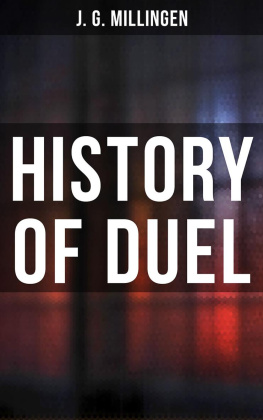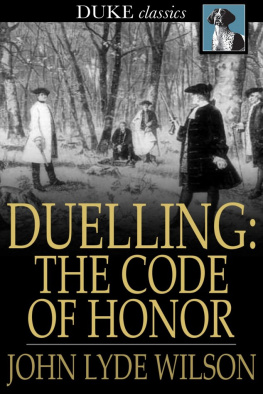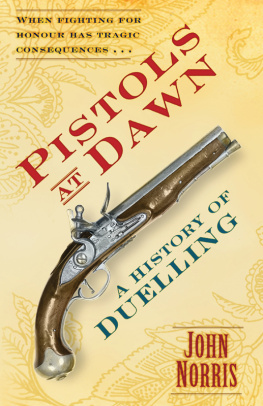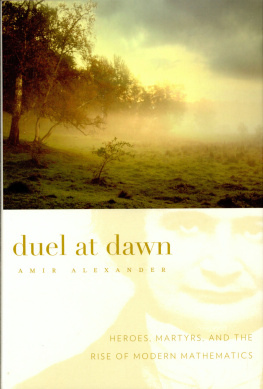Duelling Through the Ages
Duelling Through the Ages
Stephen Wynn
First published in Great Britain in 2021 by
Pen & Sword Military
An imprint of
Pen & Sword Books Ltd
Yorkshire - Philadelphia
Copyright Stephen Wynn, 2021
ISBN 978 1 52673 853 0
eISBN 978 1 52673 854 7
Mobi ISBN 978 1 52673 855 4
The right of Stephen Wynn to be identified as the Author of this work has been asserted by him in accordance with the Copyright, Designs and Patents Act 1988.
A CIP catalogue record for this book is available from the British Library.
All rights reserved. No part of this book may be reproduced or transmitted in any form or by any means, electronic or mechanical, including photocopying, recording or by any information storage and retrieval system, without permission from the Publisher in writing.
Pen & Sword Books Ltd. incorporates the Imprints of Pen & Sword Archaeology, Atlas, Aviation, Battleground, Discovery, Family History, History, Maritime, Military, Naval, Politics, Railways, Select, Transport, True Crime, Fiction, Frontline Books, Leo Cooper, Praetorian Press, Seaforth Publishing, Wharncliffe and White Owl.
For a complete list of Pen & Sword titles please contact
PEN & SWORD BOOKS LIMITED
47 Church Street, Barnsley, South Yorkshire, S70 2AS, England
E-mail:
Website: www.pen-and-sword.co.uk
or
PEN AND SWORD BOOKS
1950 Lawrence Rd, Havertown, PA 19083, USA
E-mail:
Website: www.penandswordbooks.com
This book is dedicated to all front-line staff, no matter what role they performed in keeping their communities safe and the country running, and also in memory of the tens of thousands of people who sadly died during the Covid-19 virus pandemic throughout the course of 202021.
Introduction
One description of the word duel, albeit a nineteenth century one, is:
A pre-arranged combat between two persons, fought with deadly weapons according to an accepted code of procedure, especially, but not specifically, to settle a private disagreement .
As such events were, more often than not, the sole domain of officers and gentlemen, the rules by which they were undertaken were based on the medieval code of chivalry, and concerned a mans reputation and honour, which for some men are still of importance even today. It was a way in which men could resolve a disagreement between themselves if they felt that they had been wronged by another, usually verbally, but not exclusively so.
For some, a duel also provided them with the ability to quarrel with somebody (who might not be as capable as themselves), with the sole intention of acquiring their wealth and belongings.
To achieve this was a simple process. Identify a wealthy individual, call him a coward, accuse him of being a liar, or claim the individual had slurred the accuser in some made up words or deeds. In such a case, if the wealthy individual didnt challenge his accuser to a duel, his own reputation would be at stake, as it would be assumed that by not doing so it meant the initial accusation or slur must be true.
A more difficult scenario I struggle to contemplate, was the one of turning the other cheek i.e. ignoring the perceived or intended slur on ones character and simply walking away. The injured party would demand satisfaction from their accuser in what today might be seen as the somewhat theatrical manner of throwing a glove on the ground in front of them. At the time, such a gesture was viewed as being extremely insulting, leaving the recipient of the act with only one real course of action: to pick up the glove, and accept the challenge.
In essence, a man was damned if he did and damned if he didnt. Looking back on it now, it all seems so very childish and little more than a petulant infant demanding to get its own way, and resorting to throwing a tantrum, or a fit of pique, when it didnt. But at the time, a mans reputation, especially in the ranks of the nobility and the upper classes, was everything.
Now we know why duels took place, the next point to clarify is the process. By this I mean the choice of weapons, which understandably had to be exactly the same for both men. You obviously couldnt have a scenario when one man had a doubled-handed long sword whilst the other had a foil. Most duels during the late sixteenth, seventeenth and eighteenth centuries were fought with swords, usually rapiers, but by the late eighteenth century, many duels in England were conducted using pistols.
Duelling can be traced back to the medieval period of history as well as the time of the Roman Empire. In 1215, legislation against it as an activity was brought in by the Fourth Council of the Lateran, which in laymens terms, means a council that was convoked by Pope Innocent III, at Romes Lateran Palace, beginning on 11 November 1215.
In the immediate wake of the Thirty Years War, which was fought predominantly throughout Central Europe between 1618 and 1648, in what was known at the time as the Holy Roman Empire, civil legislation was passed to prevent duelling from taking place.
Through the pages of this book I will explore what duelling looked like during the different periods and countries it took place in. I will also look at the rules and regulations which governed duelling, its decline and outlawing, and its eventual inclusion in the Olympic Games.
CHAPTER ONE
General Overview
A duel fought between members of the aristocracy, military personnel and gentlemen during the seventeenth, eighteenth and nineteenth centuries throughout most of western Europe, was a different affair to say that of a fight between gladiators in Roman times, samurai warriors engaging in Ikki-uchi, or gunfights in the American Wild West, where the overall intention was for a man to defeat and/or kill his opponent. But in their own way, each of these different variations was a duel, with one man pitting his wits and fighting skills against an adversary with the aim of beating him.
The European version of duelling was also practised in America throughout the seventeenth and eighteenth centuries, but only between the very elite of society, where it was viewed more as a matter of honour and respect; important issues for most men of the day.
So as not to cause confusion whilst examining the different versions of duelling, for clarity I will separate the British, Roman and European versions. Many of the earlier versions of the practice were conducted solely with the use of a sword or rapier, but by the end of the late eighteenth and turn of the early nineteenth century, most duels were carried out with pistols, although not exclusively. Duelling (as in the European version), had all but ceased throughout America by the end of the American Civil War in 1865.
In medieval times, judicial duels, i.e. those that were officially acknowledged and approved by a king or his parliament, were commonplace in society throughout Britain, Ireland and most of Europe. Such duels were nearly always to do with a personal slight to somebodys honour, which hadnt been resolved through that countrys court system.


















